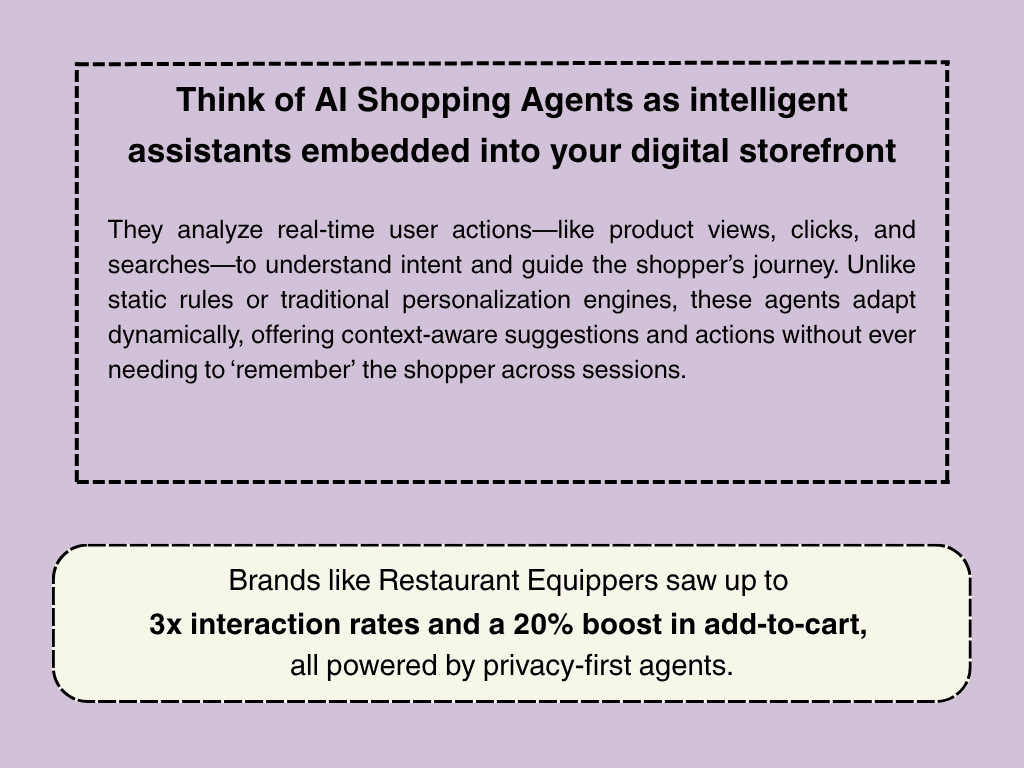As digital privacy standards strengthen and third-party cookies become obsolete, brands are rethinking how to deliver personalized shopping experiences without compromising trust or compliance. Advances in AI-powered shopping agents now offer a framework that empowers enterprises to achieve real-time relevance and engagement while putting consumer privacy at the center.
Understanding the end of cookies and the personal data shift
By the end of 2025, over 90% of global web traffic will occur in browsers that block third-party cookies. Personalization, as we know it, is being redefined. For leading brands, adapting to this environment means embracing new methods that balance privacy protection with strong business results.
Key facts:
- Google Chrome plans to deprecate third-party cookies as per their announcement.
- Firefox and Safari already block them by default.
- Consumers are increasingly opting out of tracking, reducing the efficacy of traditional data strategies, according to Pew Research.
This change implies that ecommerce brands need to adopt new approaches centered on first-party data, in-session behavior, and consent management.
As these traditional personalization pillars crumble, what takes their place? Enter session-based AI.
Leveraging session-based AI for real-time personalization
Session-based AI personalization is emerging as a best practice for respecting privacy while maintaining relevance. This method uses only real-time interaction data from the current shopping session, such as items browsed, filters applied, and on-site search queries, without building persistent user identifiers.
Session-based AI enables brands to personalize recommendations and promotions for both anonymous users and those who decline data-sharing, while protecting privacy and complying with regulations.
Studies show this approach can drive meaningful lifts in conversion and engagement, even in high-consent or opt-out markets.

How session-based AI enables privacy-first personalization
Session-based AI is a real-time personalization method that uses data from a shopper’s current visit, such as product views, search terms, and clicks, without creating persistent user identifiers.
Benefits of session-based personalization:
-
Works for anonymous users and those who opt out of tracking.
-
Complies with strict privacy laws by avoiding long-term profiling.
-
Improves real-time engagement and relevance.
According to a McKinsey report, retailers using session-based AI saw up to 15% higher conversions in opt-out environments.
But session data alone isn’t enough. To truly personalize without profiles, brands are combining it with real-time contextual signals.
Driving contextual recommendations with first-party signals
Contextual AI models rely on immediate first-party data such as product, category, or page context and aggregate on-site browsing patterns. Enterprise retailers are increasingly using these signals for:
- Similar products and cross-sell recommendations based on real-time content and user actions
- Dynamic ranking and merchandising that adapts to category trends and stock levels
- Enabling “shop the look” or “complete the set” features based entirely on in-session data
Contextual AI reduces reliance on persistent profiles and still delivers relevant experiences, helping brands meet local privacy requirements while maintaining a strong shopper journey.
Managing consent and empowering customer choice
Effective consent management is essential for privacy-first personalization. Shoppers must have clear options to accept, modify, or revoke data usage preferences throughout their journey.
- Transparency: Provide clear, granular choices and explain how each level of consent affects the shopping experience.
- Agility: Adapt the depth of personalization in real time, depending on the shopper’s active consent status and channel.
- Trust: Allow shoppers to view and adjust their data preferences at any moment across all platforms.
Forrester research shows that companies with transparent consent policies have 35% higher trust ratings among shoppers. Hence, brands that handle consent diligently not only reduce compliance risk but also foster greater trust and loyalty.
Preparing for evolving global privacy regulations
Enterprises can future-proof their personalization strategies by:
- Conducting regular privacy assessments against global standards
- Minimizing unnecessary data collection and enforcing short retention periods
- Delivering clear communication around privacy practices, value exchange, and consent options
The competitive advantage of privacy-first AI agents
Moving beyond traditional tracking, privacy-first AI shopping agents are enabling brands to deliver relevant, high-performing experiences even in privacy-conscious environments. Brands that embrace session-based and contextual AI, backed by intelligent consent management, are positioned to build deeper trust, loyalty, and sustainable growth.
For ecommerce companies seeking to operationalize these approaches at scale, enterprise-ready solutions like the Netcore Unbxd Shopping Agent are designed to meet both business and privacy needs, enabling confident commerce in a rapidly changing regulatory landscape.